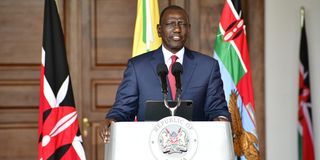Teachers' strike. William Ruto calls town-hall meeting at KICC

In this file photo, President William Ruto delivers a speech at State House, Nairobi. He is set to hold a town-hall meeting on August 25, 2024 at the KICC in Nairobi.
President William Ruto is set to address the nation on the new university funding model, the looming teachers’ strike, among other issues bedeviling the education sector on Sunday evening.
A Sunday dispatch from the Education ministry says Dr Ruto will discuss “pertinent issues on education” in a town-hall meeting at the Kenyatta Convention Centre (KICC) in Nairobi.
The announcement of the meeting comes amid a major split between two main teachers’ unions— the Kenya National Union of Teachers (Knut) and the Union of Post Primary Education Teachers (Kuppet)— on withdrawal of labour on Monday.
On Sunday, Knut National Executive Council withdrew its strike notice after holding a meeting at its headquarters in Nairobi.
Secretary-General Collins Oyuu said decision was to give the Teachers' Service Commission time to address their major demands. He called on all Knut members to report to school on Monday.
Knut's decision came hours after Kuppet National Governing Council voted 68 Yes, 2 No to endorse the industrial action, and instructed its members to keep off schools on Monday.
Secretary-General Akelo Misori said there was no going back, citing the government's failure to address teachers’ demands.
“We are urging our teachers not to go near the schools or even give the impression that they are heading there. The strike is on," he said.
He noted that the Teachers’ Service Commission (TSC) had only addressed one, Phase II of their Collective Bargaining Agreement, of the 10 issues presented by the union, including promotion, and hiring of intern teachers.
“During our meeting at the School of Government, the Teachers Service Commission showed no commitment to addressing any of the issues, and despite the significance of the meeting, we left without signing any document,” he said.
The secretary-general criticised the government's handling of the situation, particularly the remarks made by the Finance Cabinet Secretary John Mbad regarding the recruitment of 46,000 secondary school teachers, which was dismissed as unsubstantiated.
“He claimed that the recruitment of 46,000 unionised secondary school teachers was merely mentioned by the parliamentary education committee and not a confirmed fact. However, after researching, we found that this was not the case, as it had been discussed, and when we issued the strike notice, we were under the impression that the government was committed to employing the 46,000 teachers,” he said.
Kuppet reiterated its stance that the teaching profession must be protected from what it described as the "casualisation" of teachers— highlighting concerns over poor labour practices and the introduction of undefined contracts.
“TSC has decided to undermine the teaching profession by recruiting already qualified and registered teachers as mere casual workers. The generalisation of the teaching profession must end, and the introduction of poor labor practices or undefined contracts must be stopped immediately. This is why, as we stand here, the protection of the teaching profession must be a central focus in this ongoing conflict,” he said.
Mr Misori further mentioned that the Labour Cabinet Secretary Alfred Mutua's failure to appoint a conciliator by Friday had compelled them to proceed with the strike, despite the lack of a definite timeline for negotiations.
“On that basis, we sent him an email stating that the strike cannot be halted until this body convenes. Despite this, the body has determined that teachers across the country will not fully return to work and will make sure that no learning occurs within their jurisdiction,” he said.
The union further highlighted that this implies the promise of implementing the CBA was never intended to be fulfilled.
“The teachers of Kenya, along with parents and anyone concerned about education in the country, need to give serious attention to this strike, as it is a critical issue,” he added.
Kisumu County branch Kuppet executive secretary Zablon Awange on Sunday said they would kick off day one of the strike with a church service in the city centre.
He called on officials from all the seven sub counties to coordinate the activity, which will also include picketing and submission of their memorandum to the Teachers Service Commission's regional office.
In solidarity with the national office, Mr Awange called on teachers to turn out in large numbers to push the government to honour all their demands.
“As a branch, we met last Thursday and agreed that the strike is on until the teachers’ employer addresses all our grievances without exception,” he said.
Mr Awange termed it "unfortunate" the revelation that teachers have been blacklisted by the Credit Reference Bureaus (CRB) due to the delays by TSC to remit their loan premiums.
Reports by Harry Misiko, Mercy Simiyu, Charles Wasonga, and Victor Raballa.





